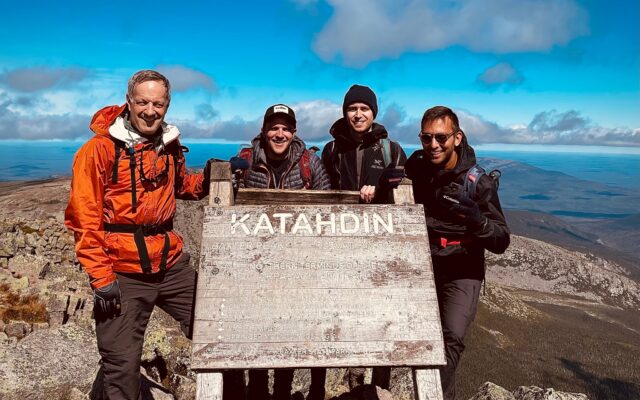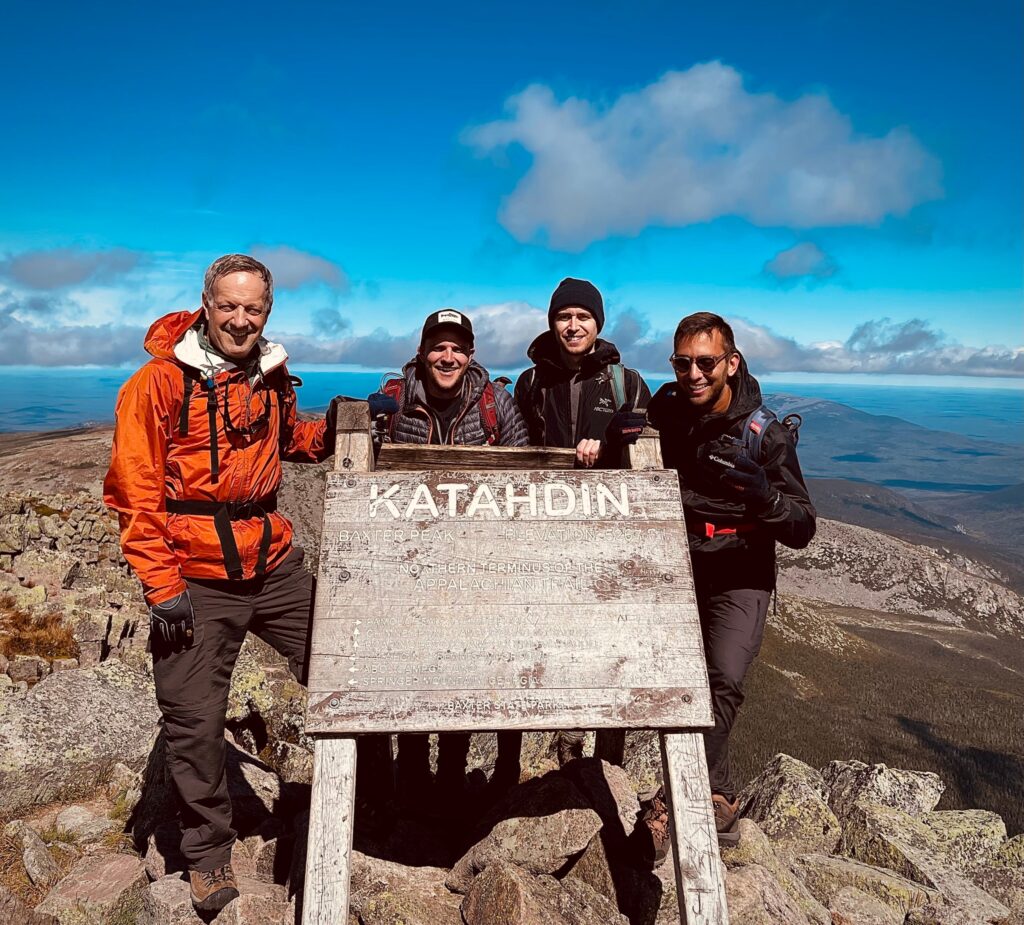
Maine students experience what it’s like to be lost on Katahdin
By Kathleen Phalen Tomaselli, Houlton Pioneer Times Staff
For 98 minutes, about 1,600 school kids, from Millinocket to Fort Fairfield, will be transported into the sometimes terrifying tale of the boy who survived alone in the harshest of Maine landscapes.
Throughout November, students from 13 school districts are slated to come to a personalized screening of the Nov. 1 nationally released film “Lost on a Mountain in Maine” at the Temple Theater in Houlton.
For the first time, the true survivor tale of Donn Fendler, the 12-year-old who walked 80 miles over nine-days while lost on Katahdin in 1939, will play out on the big screen for students, many of whom have never been in a movie theater.

SUMMIT FILMING — The creators of Lost in a Mountain in Maine, from left, Dick Boyce, Ryan Cook, Derek Desmond and Andrew Kightlinger shot portions of the film from the top of Katahdin.
This film brings to life the lessons of perseverance, resourcefulness, and courage that the book, a memoir penned by Fendler with Joseph Egan, has taught for generations, said Temple Theater Manager Jason Howe who organized the series of screenings.
“We wanted to give schools the chance to engage with the story in a new, exciting way,” Howe said, adding that the book has been on the Maine state curriculum for 60 or 70 years. “It happened in our backyard.”
On Nov. 1 the first group of 69 Hodgdon Middle School students poured into the historic downtown theater for their own personalized showing of the film. Volunteers belonging to the local service group Houlton Gateway Ambassadors were on hand to help with popcorn, drinks and guiding students to seats in the theater.
Actor Luke David Blumm, who plays Fendler in the film, and director Andrew Kightlinger, created video messages for the students to see before the feature-length film began. Giving them several questions to ponder while watching the film, they encouraged the students to think about Fendler’s life-changing experience and to consider how it relates to their own lives.
“As you watch I want you to think about a few questions that will help you better understand Donn’s journey and the choices he made,” said Kightlinger.
He tasked the students with discovering three mistakes Fendler made, the things he did that helped him survive and what did the students learn from Fendler’s story that may help them through a difficult situation.
Blum asked the students to imagine what it would be like to be lost like Fendler.
“What do you think helped Donn keep going when it seemed impossible,” he said. “Is there something you rely on when things get tough? What decisions would you have made if you found yourself in an emergency like this one?”
The questions helped eighth grader Jaida Jackman look for those ideas in the film, she said.
Like most Maine students, Jackman read the book, but the film gave her a better idea of what Fendler experienced, she said. And the scenes that went back to actual historic footage of rescuers finding Fendler were really cool, she said.
“I think he was really brave and I don’t know if I could do that,” Jackman said. “It was pretty awesome and there were points of the movie that gave you that spark.”
The film showed her that if you come to a serious problem you can be more confident, she said.
Hodgdon middle school teacher Heather Howland said that the film is a great teaching tool.
“The students sat calmer than we expected, so they must have enjoyed it,” she said, adding that she plans to touch base with them next week to hear their thoughts on it.
Ryan Cook, the film’s producer who has worked on the Donn Fendler story for the past 14 years, first learned about Fendler’s ordeal while a fourth grade student at Albert S. Hall school in Waterville.
“Donn came to my classroom,” Cook said. “His favorite thing in the world was coming to Maine and talking to students. For 25 years he basically did a school book tour going from classroom to classroom and talking to students, talking about his book and his adventure.”
The two men reconnected in 2010 after Cook graduated from film school and approached Fendler about making a film.
Fendler was reluctant, sharing with Cook that people had been trying to make a movie about his ordeal for 30 years and nobody was able to do it,
“I told him, ‘I’m not the guy that goes away,’” Cook said.
And along with his film partner Derek Desmond they traveled around Maine with Fendler to school events, recording and sitting on his porch in Newport, talking.
The two filmmakers created a documentary that won a Maine International Film Festival award that led to the development of a proof of concept, a short film illustrating the larger film idea.
In 2016 Fendler died, and that was difficult for Cook, he said, adding that at the same time it strengthened their resolve.
“We have to get this movie made and we have to do it the right way. We have to do justice to Donn Fendler’s legacy,” he said.
In 2018 Cook got a call from Dick Boyce, who saw their proof of concept short film. Boyce also had his own personal connection to the story. He read the book as a kid and he read the book to his kids, Cook said, adding that they partnered with Boyce.
Through Boyce’s connections, the team eventually partnered with Sylvester Stallone’s Balboa Productions to make the film together.
Once he knew the film was coming to Houlton, Howe reached out to Cook about his idea of bringing in the school kids for the screenings and the team immediately hopped on board, Howe said, adding that he put the list of questions together for the students.
“My hope is it will create some conversations among the students on their bus ride home or in class the next day,” Howe said.
Before leaving the theater, students and teachers got packets with discussion questions and movie passes.
In addition to the private school screenings, the film is also slated for public screenings throughout November.